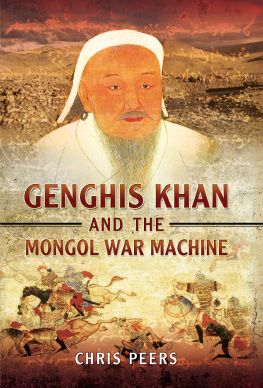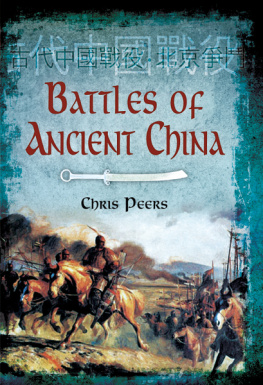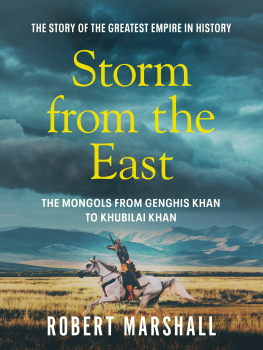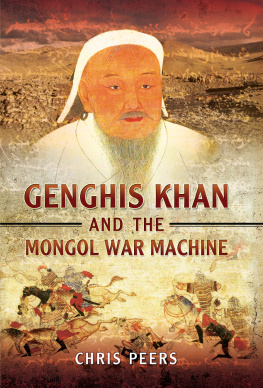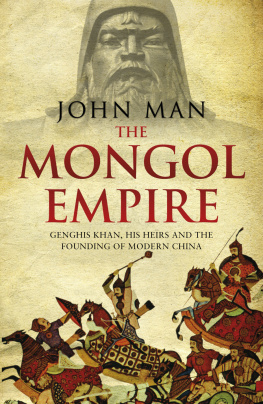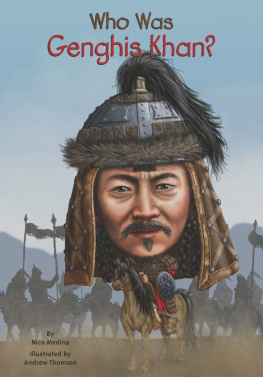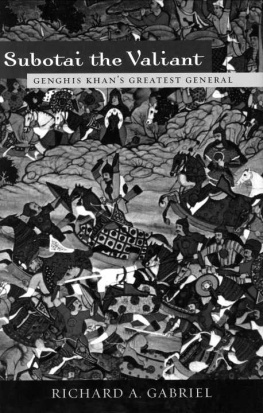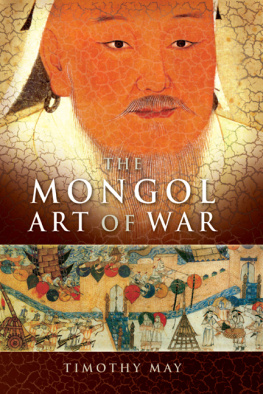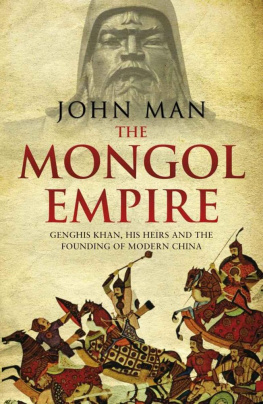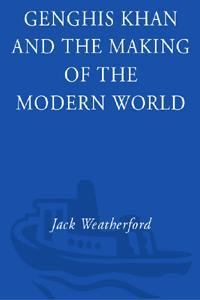Contents
List of Plates
Timeline: The Mongol Conquests and the Career of Genghis Khan
| c. 800 AD | Emergence of Mongol tribes. |
| 907 | Foundation of Khitan Liao dynasty. |
| 960 | Foundation of Sung dynasty in China. |
| 1138 | Foundation of Tangut Hsi Hsia dynasty. |
| 1125 | Liao overthrown by Jurchens. Qara-Khitai state established. |
| c. 1150 | Kabul Khan forms first Mongol confederation. |
| 1161 | Kabul Khan defeated by Jurchens. |
| c. 1162 | Birth of Temujin. |
| c. 1170 | Death of Temujins father, Yesugei. |
| 1177 | Temujin escapes from Tayichiut captivity. |
| 1178 | Temujin marries Borte and swears allegiance to Toghril. |
| 1179 | Abduction of Borte and war with the Merkits. |
| c. 11801210 | Drought in Mongolia. |
| 1186 | Khwarizmian Empire founded. |
| c. 1189 | Temujin becomes Khan, takes title of Genghis. |
| c. 1190 | Genghis defeated by Jamuqa at Dalan-baljut. |
| 1195 | Genghis joins Jurchens in war against Tatars. |
| 1201 | Battle of Koyiten. Jamuqa defeated and Tayichiuts destroyed. |
| 1202 | Genghis defeats Tatars at Dalan-nemurges. |
| 1203 | First campaign against Naimans. Split with Toghril. Genghis defeated at Qalaqaljit Sands. Baljuna Covenant. Keraits defeated at Jer-qabchiqay Pass. |
| 1204 | Second war with Naimans. Genghis victorious at Mount Naqu-kun. Merkits defeated at Black Steppe. |
| 1205 | Capture of Jamuqa. First Mongol raids against Hsi Hsia. |
| 1206 | Genghis proclaimed ruler of Mongolia. |
| 1209 | Uighurs submit to Genghis. |
| 12091210 | First war with Hsi Hsia. |
| 1211 | Invasion of Chin Empire. Genghis victorious at Battle of Huan-erh-tsui. |
| 1215 | Capture of Chung-tu. |
| 12151216 | Samukhas raid into China. |
| 1216 | Wars against Tumads and Merkits. Kirghiz revolt suppressed. First clash with Khwarizmians. Victory over Chin at Shen-shui. |
| 1217 | Mukhali appointed viceroy in China. |
| 1218 | First invasion of Korea. Jebei conquers Qara-Khitai. Mukhali defeats Chin at Battle of Lang-ya Ling. |
| 1219 | Genghis invades Khwarizmian Empire. |
| 1220 | Capture of Bokhara and Samarkand. Mukhali defeats Chin at Huang-ling-kang. |
| 1221 | Battles of Parvan and the Indus River. Defeat of Jalal ud-Din. Invasion of India. |
| 12211223 | Jebei and Suboteis Black Sea campaign. |
| 12221227 | War with Sung Chinese. |
| 1223 | Russians defeated at Battle of Kalka River. Mongols repulsed by Bulgars. Death of Mukhali. Mongols defeat Sung at Battle of Wu-ma Hills. |
| 1224 | Second invasion of Hsi Hsia. Tanguts again submit. |
| 1225 | Tanguts form alliance with Chin. Third Mongol invasion of Hsi Hsia. |
| 1227 | Death of Genghis. Final defeat of Hsi Hsia. Succession of Ogodei Khan. |
| 1228 | Jalal ud-Din defeated at Battle of Isfahan. |
| 1231 | Death of Jalal ud-Din. |
| 1234 | Capture of Kaifeng. End of the Chin dynasty. |
| 12371241 | Mongol invasion of Europe. |
| 1241 | Death of Ogodei. |
| 1256 | Mongol invasion of Middle East. |
| 1260 | Accession of Kubilai as Great Khan. Mongols defeated by Egyptians at Ain Jalut. |
| 1268 | Civil war between Kubilai and Kaidu. Fragmentation of Mongol Empire. |
| 1271 | Kubilai proclaims Yuan dynasty in China. |
| 1279 | Final defeat of Sung. |
| 1368 | Fall of Yuan dynasty. |
The Family Tree of Genghis Khan (Great Khans and the period of their reigns in capitals)

Whos Who in Thirteenth-Century Mongolia
Ala-qush-digit-quri : Chief of the Ongguts and commander of the Onggut contingent in the Mongol army in 1206.
Ala-qush Tagin : Chief of the Ongguts, successor to Ala-qush-digit-quri and ally of Genghis in the wars in China.
Ambakai : Nephew of Kabul Khan, executed by the Jurchens in 1161.
Bekter : Half-brother of Temujin, killed by the latter in a childhood quarrel.
Belgutei : Half-brother of Temujin.
Boorchu : One of Genghis four war-horses.
Boroqul : One of Genghis four war-horses, killed by the Tumads in 1216.
Borte : Genghis senior wife.
Buyiruq Khan : Naiman chief defeated by Genghis in 1202.
Chagatai : Second son of Genghis and founder of the Chagatai Horde.
Chaghan : Officer of Tangut origin, commander of Genghis guard in 1206.
Chilaun-baatur : One of Genghis four war-horses.
Dorbei Doqshin : Mongol officer. Victor in the Tumad War of 1216, sent to invade India in 1221.
Gemyabek : Mongol officer, killed by the Russians in 1223.
Hoelun : Wife of Yesugei and mother of Temujin.
Inancha-bilge Khan : Naiman chief, father of Tayang Khan.
Jaafar : Muslim merchant and spy in Genghis employ.
Jamuqa : Chief of the Jajirat Mongols, childhood friend and later rival of Genghis. Executed in 1205.
Jarchiudai : Chief of the Uruut Mongols and father of Jelme.
Jebei : Former Tayichiut prisoner of war, one of Genghis four hounds. Conqueror of Qara-Khitai and commander of Russian expedition, died c. 1223.
Jelme : Son of Jarchiudai and one of Genghis four hounds.
Jirqoadai see Jebei.
Jochi : Eldest son of Genghis, died 1227.
Kabul Khan : Great-grandfather of Genghis and founder of first Mongol confederation. Defeated by Chin in 1161.
Kokseu-sabraq : Naiman general.
Kubilai Khan : Grandson of Genghis and founder of the Yuan dynasty in China.
Kuchluq : Naiman prince, son of Tayang Khan. Took over Qara-Khitai, and was defeated and killed by Jebei in 1218.
Megujin-seultu : Tatar Khan, defeated by Genghis in 1195.
Metiken : Grandson of Genghis, killed at Bamiyan in 1221.
Monglik : Friend of Genghis father Yesugei and father of Teb Tengri.
Mukhali : One of Genghis four war-horses, and his viceroy in China. Died in 1223.
Ogodei : Genghis third son and successor.
Ong Khan see Toghril.
Qachiun : Brother of Temujin.
Qadaqan : Grandson of Genghis.
Qasar : Brother of Temujin, renowned for his strength and skill as an archer.
Qorchi : Mongol officer, originally a defector from Jamuqa, whose imprisonment was the cause of the Tumad War of 1216.
Qubilai : One of Genghis four hounds. His name is spelt thus in this narrative to distinguish him from Kubilai, Genghis grandson.
Qultuqan Mergen : Merkit prince, son of Toqtoa, defeated by Jochi in 1216.
Quyildar : Mongol officer, commander of the Mangquts at the Battle of Qalaqaljit Sands.
Samukha : Mongol officer, served in China 1214 to 1216.
Senggum : Kerait prince, son of Toghril, defeated by Genghis in 1203.
Shigi-qutuqu : Adopted Tatar orphan, rose to high office under Genghis. Commander at the Battle of Parvan in 1221.

